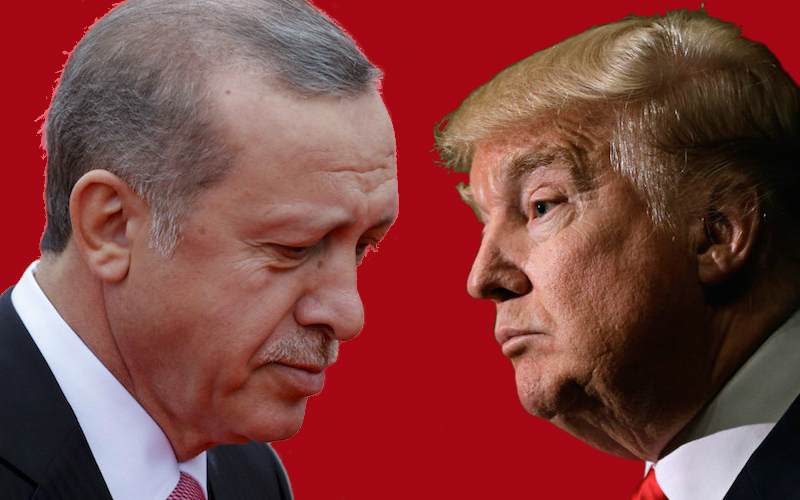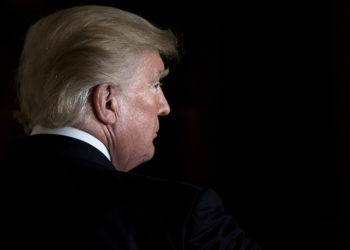President Donald J. Trump is not fond of established diplomatic etiquette. But even by his standards, announcing a decision to increase arms support for Syrian Kurdish militants on the day when Turkey’s army and intelligence chiefs were at the White House was astonishing.
Ankara is understandably upset with Washington. In the eyes of the Turkish government, the U.S. damaged the two countries’ strategic relations by approving the plan to send heavier arms to Kurdish People’s Protection Units (YPG) as part of an anticipated offensive to retake Islamic State’s self-proclaimed capital Raqqa. To placate Turkey, Pentagon promised increased protections against YPG’s sister organization, the Kurdistan Workers’ Party (PKK).
“We are clearly against this. To destroy one terrorist organization with the help of another is not an ideal policy,” Turkish President Recep Tayyip Erdogan said during a press conference in Ankara on May 12.
Unlike the U.S., Turkey considers YPG a terror group over its links to the PKK, which has been waging an insurgency against Turkey for over 3 decades. Ankara has expressed concerns that the U.S. arms supplied to the Kurdish fighters in Syria can end up with the PKK and be used against Turkey.
But the Kurdish fighters who operate under the umbrella of the Syrian Democratic Forces (SDF) remain the most capable power to swiftly isolate and retake Raqqa. The city’s fall would deliver a major blow to the terrorists, and the U.S.-led coalition fighting the group does not want to delay the offensive.
To ease tensions with a NATO ally, the U.S. vowed that its advisers accompanying the forces would monitor the use of equipment in real time. The coalition also intends to portion out the arms for each objective in the fight for Raqqa.
“We are very mindful of the Turkish concerns on this,” U.S. Department of Defense spokesperson Capt. Jeff Davis said in a briefing on May 12. “We are receiving assurances from the SDF that they are using it only to fight ISIS.”
Moreover, Washington has promised Ankara that the Kurdish forces would leave Raqqa after its liberation.
Nevertheless, Turkey is not assured. Mr. Erdogan intends to raise the issue during his meeting with his U.S. counterpart on May 16.
“I see this visit of mine as a new beginning in the Turkish-American relationship. We have observed that some of the information we received is insufficient. God willing, this visit will be a new beginning in that regard,” he said.
Dr. Lisel Hintz, Visiting Assistant Professor at Political Science Department of Columbia University’s Barnard College, told The Globe Post that many expected Mr. Erdogan to cancel his visit to the U.S. after the fallout over the arms for the Kurds, but it did not happen.
“Erdogan’s own response has so far been relatively measured, reflecting a likelihood he believes he can convince Trump to change his mind, as well as extract concessions,” Ms. Hintz said. “Trump’s mind is uneasily changed, however, and the decision to arm Syrian Kurds represents not one of Trump’s many bizarre acts on a whim, but rather the recommendation of National Security Advisor Lt. Gen. H.R. McMaster, who is widely respected in the military community and enjoys broad bipartisan support.”
Last week, Turkish army chief Hulusi Akar and intelligence chief Hakan Fidan met with Mr. McMaster in the hope of convincing the U.S. that arming Syrian Kurds was a bad idea. Instead, it was the U.S. general who delivered the news that President Trump already signed the decision to arm the Kurds.
The Turkish president has also ignored calls to close Incirlik airbase for U.S. military operations. The coalition has been using the base in Turkey’s Adana to conduct sorties against ISIS in Iraq and Syria. Ankara opened the U.S. airfield for coalition warplanes only after Syrian Kurdish militants scored military victories against ISIS on Turkey’s border.
During his meeting with President Trump, Mr. Erdogan may try to use Incirlik as a bargaining chip.
However, Dr. Jenny White, Professor at Stockholm University Institute for Turkish Studies, told The Globe Post that the base may have lost its previous appeal for the American military.
Some reports indicate that the U.S. is considering options for bases elsewhere in the region after issues with access to the base following the coup attempt last July. Back then, the Turkish authorities restricted U.S. and NATO forces from leaving the base on suspicion that some of the coup leaders were there.
“Most of Turkey’s bargaining chips seem to have fallen off the table. Even its military competence has been questioned, given the massive purge of its military that has dismissed or jailed half of its officer corps. What remains is an appeal to the camaraderie of leaders, the hope that President Erdogan’s wish list will find favor with President Trump,” Ms. White said.
On Monday, German chancellor Angela Merkel said her country is looking for alternatives to Incirlik, raising the specter of reducing military partnership with NATO’s only Muslim member.
“We will continue to talk with Turkey, but in parallel, we will have to explore other ways of fulfilling our mandate,” Mrs. Merkel said, adding that Jordan is one of the alternatives.
As compensation for the troubles, Turkey can demand some concessions from Washington, such as extradition from the U.S. of Turkish cleric Fethullah Gulen.
Mr. Gulen has been blamed by Ankara for the attempted coup. The cleric denies the accusations.
President Erdogan said he had prepared “some new documents and information” to present to Mr. Trump to prove the need for extradition. His justice minister, Bekir Bozdag, was in Washington earlier this month, pressing Attorney General Jeffrey Sessions to submit documents to a local court or issue a provisional arrest.
Ms. White noted that U.S. courts make decisions on extradition on the basis of convincing evidence, but up to date, Turkey has not presented it.
“The courts are also unlikely to extradite Gulen to a country where he will most likely face death,” she added.
Apart from Mr. Gulen, there is another person of interest for Ankara — Reza Zarrab, an Iranian-Turkish gold trader who was charged by the U.S. of violating sanctions against Iran. Ms. Hintz noted that Mr. Zarrab was also implicated in bribing top officials close to Mr. Erdogan in a major oil-for-gold scheme between Turkey and Iran.
“Trump has already fired US attorney Preet Bharara, former prosecutor on the Zarrab case, and unwavering Trump supporter Rudy Giuliani has been hired as part of Zarrab’s legal team, which may send Erdogan encouraging signs to this end,” she said.
Nevertheless, Turkey’s prospects of getting concessions from Washington remain grim and a reset in U.S.-Turkish relations seems unlikely.
In March, US Senator John McCain said American efforts to defeat ISIS and its support for the Kurds could seriously damage relations with Turkey.
“Unless something changes, I foresee a train wreck here,” he said.
Dr. Robert Jervis, Adlai E. Stevenson Professor of International Affairs at Columbia University, told The Globe Post that Mr. Trump hasn’t begun to come to grips with the implications of the conflict between Turkey and the Kurds for his Syria policy, which is still taking shape.
“Things are likely to come to a head in Raqqa,” he warned.
Earlier this month, a private intelligence firm, The Soufan Group, said in a report that the challenge of defeating ISIS in Syria “will soon be replaced with the need to balance conflicting national self-interests by an array of competing regional powers.”
Despite contradicting views, Mr. Erdogan is hopeful that he can turn a blank page in relations with Washington. In a speech last week, he pinned the blame on the transition from the Obama administration. He is not yet ready to accept that Mr. Trump may simply follow previous president’s footsteps when it comes to Turkey.
********
This article was possible thanks to your donations. Please keep supporting us here.






















